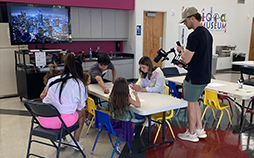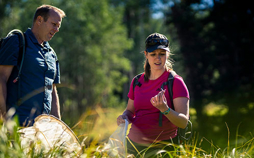Bright Ideas at an Arizona Museum
BYU students taught basic animation at a hands-on youth art center in Mesa, Arizona.
October 2023
Following a challenge to “see themselves in the restoration,” hundreds of BYU students shared their testimonies through a variety of mediums—from art, poetry, and music to websites, baked goods, and handicrafts—as part of BYU’s Foundations of the Restoration class. As students chose projects, religion professor Anthony Sweat asked them to conduct their own research and to seek inspiration into what really moves them. “I ask them to use this as an excuse to really look into something that can benefit [their] understanding and [their] faith,” he says.
Hundreds of students shared their projects during a Restoration Project Fair at semester’s end. Artist Ashley Savage displayed a painting she created of the First Vision. She says, “For me, art has always been a super special way that I can share my testimony of the gospel. This piece is called, ‘I Could Not Deny It.’ It is a depiction of the First Vision in a different perspective.”
Michael Dodds created a mosaic-style art piece using broken glass. He explains, “The artwork has a lot of meaning specifically with the shards of glass. You have to crack them and break them. Each one of these glass pieces represents an individual who has turned a question or a misconception about the gospel into faith. We have questions and doubts, but we can turn them into a testimony.”
The projects allowed students to use their creativity to deepen their conversion of the Savior. Learning more about the Foundations of the Restoration helped them to better understand and apply the teachings of the gospel of Jesus Christ in their lives.

BYU students taught basic animation at a hands-on youth art center in Mesa, Arizona.

An interdisciplinary BYU research team traveled to Nepal to measure brick workers’ exposure to pollutants and to assess their respiratory health.

Video: The BYU team’s goal is to piece together the first-ever phylogenic (genealogical) tree of all 6,300 known dragonfly species and their ancestors.